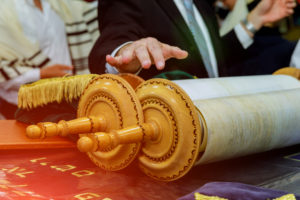
By Cantor Julie Newman
Parshat Shlach
My county will soon stop sending out the daily messages about the county’s COVID rates that many of us have gotten daily since March 2020. It has felt like a solid piece of information that I could count on.
Watching the numbers of COVID cases dropping recently literally makes me breathe easier. But it hasn’t always been so over the past 14 months. As the pandemic grew, the rising numbers in the report could make my breath catch and my heart feel squeezed. That was the lens through which I saw this year’s news, which regularly included heartbreaking headlines reporting stories of violence and injustice, provoking feelings of worry and powerlessness.
In Parshat Shlach, the Israelites experienced heartbreaking headlines. As they prepared to enter the land of Canaan, Moses sent one man from each tribe, “men of stature,” to scout the land. Their instructions were to get information about the people, the towns and the land. They were to “see the land, what it is like and the people that dwell in it.”
But having lived through the trauma of Egypt and the miracles of the Exodus, what lens would they see through in judging whether the people there were “strong or slack, few or many”? Or whether the land was good or bad and whether the towns were open settlements or fortresses? They were to evaluate whether the land was “fat or lean,” and if there were trees. And finally, they were to “muster their strength” to bring back a sample of fruit, this being the season of the first ripe grapes.
We are told that after 40 days they brought back that sample of fruit, a giant cluster of grapes carried on a pole by two men. They also brought back their headlines. They acknowledged to Moses that the land was indeed “flowing with milk and honey.” But that news was overshadowed by their conclusion that they couldn’t go up against these mighty people and large fortified towns. And although Caleb, one of the scouts, strongly contradicted the majority opinion, he didn’t deny the substance.
The majority then doubled down, emphasizing the feeling of menace from “men of huge measure,” from a land that “consumes all who dwell in it” and even the danger from sons of giants. They finish with a statement of utter powerlessness, saying “we were in our own eyes like grasshoppers and so we were in their eyes.”
Rashi, the great medieval commentator, saw this bad report, this “dibah,” as a lack of faith. But couldn’t they have just been responding to being at their emotional limit and overwhelmed? When people are overstressed, our minds are just bad at discerning between real and imagined danger. We have learned that unprocessed fear that operates outside of our consciousness can shape our beliefs, decisions and actions. Were the people of Canaan a truly outsized danger or were they imagined monsters? Did the land truly “consume all who dwell in it,” or were the scouts unconsciously consumed
with fear?
The great Chasidic master, the Maggid of Mezritch, taught that the scouts had fallen prey to a distorted perception about themselves, the land and its inhabitants. Put another way, their feelings were real, but not true.
What of the Israelites, who, upon hearing these headlines, wept loudly and bitterly into the night? In their terror, they blamed and complained. They wished aloud that they had died in Egypt. They lashed out and threatened to stone Caleb and Joshua, the only other spy to return with a positive report.
When fear feels like too much or when we feel unsafe, we can be pushed outside of what psychiatrist Daniel Siegel calls our “window of tolerance,” where fear and anger can take over. We can harm ourselves (go back to Egypt) or others (stone Joshua and Caleb) as we look for any way to not feel that fear and uncertainty. We can be cut off, separated, from our own wisdom, faith, resilience and strength.
Yet Joshua and Caleb remained connected to their inner resources. They were able to respond to the Israelites’ fear and despair with reassurance and compassion. We all have different capacities in different situations. (The health care heroes of the COVID-19 pandemic have surely shown that.)
The result of this sorry episode was that a whole generation of the Jewish people would die in the wilderness, cut off from their relationship with God, from their promised land, by fear.
How can I avoid being cut off, by the fears of our own time? How do I get back in touch with my own inner resources when reading or hearing whatever the headlines bring? I begin by finding a feeling of safety. Connecting to something I can count on. By becoming aware of my breath. By feeling my feet on the floor. By knowing that my fear may be real, but not true. This can be faith, and a prayer. l
Cantor Julie Newman is president of Tiferet, a Jewish spirituality project, and spiritual leader of Chavurat Shirah, an independent minyan. This column was provided by the Greater Pittsburgh Rabbinic Association.





